When Kehinde Osakede’s university closed due to COVID-19 last year, the visual arts student returned home to Lagos. A visit to a family friend nearby turned into a horrific ordeal.
The friend began touching her, she said, and became violent when she asked him to stop. He then raped her, she said.
“The guy was hitting me, beating me,” said Osakede, now 21, “The last notion I had was to commit suicide.”
Reuters was not able to confirm her account independently. Osakede did not share the name of her alleged assailant and said she did not want to get involved in the legal case.
Osakede is one of hundreds of women across Nigeria who have reported being raped or sexually assaulted in a surge since the pandemic began, according to police and officials. Some experts say this represents only a fraction of cases.
The president’s office referred Reuters’ questions to the Ministry of Women Affairs.
The ministry said it had helped coordinate the nation’s response to rape and gender-based violence, including by setting up a national response team and meeting different ministries and non-governmental organizations.
Around the world, police and prosecutors, victim support teams and women’s movements, as well as the United Nations, have reported rising domestic violence during coronavirus-related lockdowns.
Lagos state, where Osakede lives, saw a nearly 40% increase in rape and domestic and sexual violence in 2020, official data showed.
After a string of high-profile attacks, including the gang rape of a 12-year-old girl in northern Jigawa state, President Muhammadu Buhari declared a nationwide state of emergency in June last year to tackle the crisis.
Police did not respond to requests for comment for this article, but in June last year they said reports of rape had risen during the pandemic and introduced measures to improve police response to gender-based violence.
Some Nigerian women are now acting to address the problem of sexual violence, saying that cases have ended in few prosecutions, widespread stigmatization and a tendency to blame victims.
The National Agency for Prohibition of Trafficking in Persons and the police did respond when asked how many prosecutions of rape cases in Nigeria there had been.
Activists have launched centres to support women, an app to report attacks and a push to protect girl victims from being traumatized again in the legal system.
DIFFICULT PATH
They face a difficult path. Polling group NOIPolls found that 47% of Nigerians blamed rape on indecent dressing, and fewer than half thought offenders should be punished.
The 2018 official Nigeria Demographic and Health Survey found that 30% of girls and women aged between 15 and 49 reported suffering sexual abuse.
The government has declared a state of national emergency over rape and gender-based violence and says it has directed the police and the states to do everything they can to tackle it.
Some activists and lawyers have described child rape cases settled for just 10,000 naira ($26), and courts where cases languish for years.
“This is such a systemic problem – such a magnitude, that you’re very quickly overwhelmed,” said Kemi DaSilva-Ibru, a gynaecologist who founded the Women at Risk International Foundation (WARIF), a donor-funded non-profit organization that treats rape victims and helps police gather physical evidence.
DaSilva-Ibru launched WARIF, which helped Osakede with counselling and group therapy, after years of treating rape victims as young as two.
In Lagos, senior lawyer Boma Alabi is rallying others in her profession to protect underaged victims when cases go to trial.
“Children being cross-examined like adults, children who have been traumatized by defilement … it shouldn’t be happening,” she said.
The attorney general did not immediately respond to a request for comment on how the children were treated in court.
In northern Kano state, tech entrepreneur Sa’adat Aliyu in August launched an app, Helpio, for women to report assaults. She said it matched users with organizations who help them approach the police.
“These victims don’t know there are actually organizations that fight for their rights and give them legal support, also medical or financial support,” she said.
Osakede says she has stopped blaming herself with the help of counselling at WARIF, and wants others to take courage from her story.
“I came to this place, and I started feeling okay,” she said.



